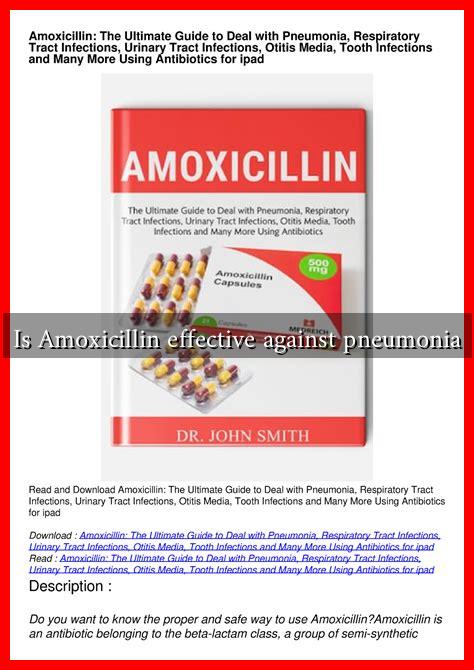-
Table of Contents
Is Amoxicillin Effective Against Pneumonia?
Pneumonia is a serious respiratory infection that can affect individuals of all ages, leading to significant morbidity and mortality worldwide. Among the various treatment options available, antibiotics play a crucial role in managing bacterial pneumonia. One commonly prescribed antibiotic is amoxicillin. This article explores the effectiveness of amoxicillin against pneumonia, its mechanisms, and considerations for its use.
Understanding Pneumonia
Pneumonia is an infection that inflames the air sacs in one or both lungs, which may fill with fluid or pus. It can be caused by various pathogens, including bacteria, viruses, and fungi. The most common bacterial causes of pneumonia include:
- Streptococcus pneumoniae
- Haemophilus influenzae
- Mycoplasma pneumoniae
- Chlamydia pneumoniae
Symptoms of pneumonia can range from mild to severe and may include cough, fever, chills, and difficulty breathing. The treatment approach often depends on the causative organism, the severity of the disease, and the patient’s overall health.
Amoxicillin: An Overview
Amoxicillin is a penicillin-type antibiotic that is effective against a variety of bacterial infections. It works by inhibiting the synthesis of bacterial cell walls, leading to cell lysis and death. Amoxicillin is often used to treat infections such as:
- Ear infections
- Throat infections
- Urinary tract infections
- Skin infections
Its broad-spectrum activity makes it a popular choice for treating respiratory infections, including pneumonia.
Effectiveness of Amoxicillin Against Pneumonia
Amoxicillin is particularly effective against certain types of bacterial pneumonia, especially those caused by Streptococcus pneumoniae and Haemophilus influenzae. According to the Centers for Disease Control and Prevention (CDC), these bacteria are among the most common pathogens responsible for community-acquired pneumonia (CAP).
Several studies have demonstrated the efficacy of amoxicillin in treating pneumonia:
- A study published in the *New England Journal of Medicine* found that amoxicillin was as effective as more potent antibiotics in treating mild to moderate pneumonia caused by Streptococcus pneumoniae.
- Research in the *Journal of Antimicrobial Chemotherapy* indicated that amoxicillin is effective in reducing the duration of symptoms and improving clinical outcomes in patients with CAP.
However, the effectiveness of amoxicillin can be limited by antibiotic resistance. The emergence of resistant strains of bacteria has raised concerns about the efficacy of standard treatments. According to the World Health Organization (WHO), antibiotic resistance is a growing global health threat, making it essential to use antibiotics judiciously.
Considerations for Use
While amoxicillin can be effective against certain types of pneumonia, it is not suitable for all cases. Factors to consider include:
- Type of Pneumonia: Amoxicillin is primarily effective against bacterial pneumonia. Viral pneumonia or pneumonia caused by atypical bacteria may require different treatment.
- Severity of Illness: Patients with severe pneumonia or those requiring hospitalization may need broader-spectrum antibiotics or intravenous therapy.
- Patient History: A patient’s medical history, including allergies and previous antibiotic use, should be considered when prescribing amoxicillin.
Conclusion
Amoxicillin can be an effective treatment option for certain types of pneumonia, particularly those caused by common bacterial pathogens. Its broad-spectrum activity and favorable safety profile make it a valuable tool in the management of respiratory infections. However, the rise of antibiotic resistance necessitates careful consideration of its use. Healthcare providers must evaluate each case individually, taking into account the type of pneumonia, severity, and patient history to ensure optimal treatment outcomes.
For more information on pneumonia and its treatment, you can visit the CDC Pneumonia Page.

